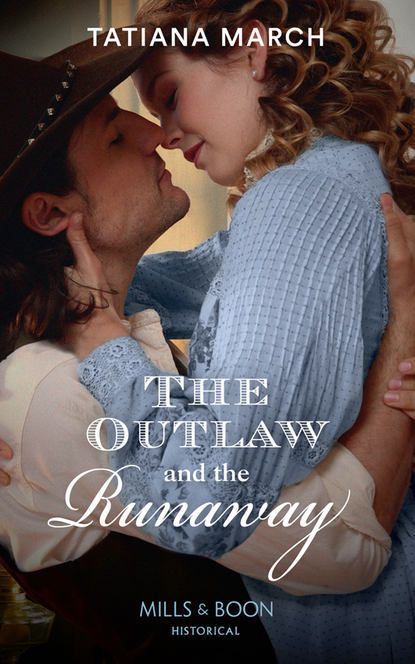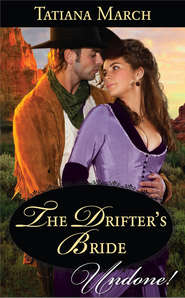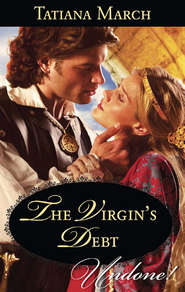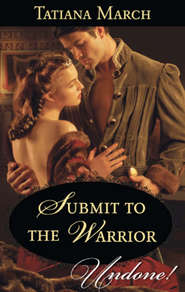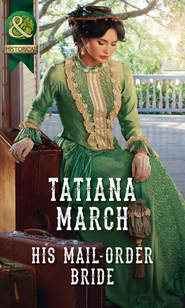По всем вопросам обращайтесь на: info@litportal.ru
(©) 2003-2024.
✖
The Outlaw And The Runaway
Настройки чтения
Размер шрифта
Высота строк
Поля
Celia wished she could stop babbling about her misfortunes but her tongue refused to be reined in. When she paused to fight the urge to weep, the stranger swept a careful look around them and tugged at the rawhide cord securing the patch over his left eye. She’d been wondering what damage he was hiding beneath, and now she felt ashamed for her curiosity. It was no business of hers. She steeled herself against the sight of his injury, and then gasped as she met the blinking gaze of a perfectly healthy brown eye.
“Your eyes,” she breathed. “They’re of different color.”
“One pale blue, one dark brown.” The man restored the patch over his brown eye. “It’s supposed to be the sign of a witch. Or, the way a girl put it once, God and the Devil are fighting over me, with one half each. A fallen angel, she called me.”
Fascinated, Celia studied his face. Fallen angel. The description fitted. The stranger had elegant, finely crafted features, with a straight nose and high cheekbones, and wide, well-defined lips. The tall, rangy body and the breadth of his shoulders added a stamp of rugged masculinity to looks that otherwise might have appeared too beautiful for a man.
Shamelessly, Celia let her gaze linger on the man’s countenance, wishing he hadn’t slipped the black cotton patch back in place. “Is that why you cover up your brown eye?” she asked. “As a protection from prejudice?”
“No.” The stranger seemed to hesitate. “Having different-colored eyes is a distinctive mark. When a man rides the owl hoot trail—”
“What’s that?” Celia broke in.
“Owl hoot trail. It means the outlaw trail.”
“You’re an outlaw?” She felt compelled to ask the question, even though she’d already guessed the answer. Even now, she could see the shape of the twin holsters beneath his long duster, knew he was wearing a double rig of pistols, and despite his handsome features there could be no mistaking the air of lawlessness about him.
It occurred to Celia he might know her father was the teller at the bank. Behind his kindness might lurk a plan to extract information out of her. However, so far the stranger hadn’t mentioned the bank. Perhaps, after all, he had merely bid for her picnic basket as a caper, an amusing way to spend an hour while his partner was occupied with some errand.
Despite his criminal associations, Celia couldn’t help but be drawn to the fair-haired outlaw. His kindness appeared genuine, not calculated. Moreover, there seemed to be an air of decency about him, a sense of honor. With a sudden lurch of her heart, Celia accepted that the outlaw had made himself vulnerable by confiding in her. By revealing his secret, he had offered her a weapon she could use against him.
“Why are you telling me this?” she asked quietly. “If such a distinctive feature might give you away, are you not worried that I might go to the marshal and enlighten him?”
“Rock Springs has no marshal and the county sheriff is fifty miles away.”
The answer came swiftly, the tone cool and confident. For a week now, the outlaws had been hanging around the town, and the man’s reaction solidified Celia’s suspicions. Are you planning to rob the bank? The question sprang to her tongue but she left it unsaid. As long as her father wasn’t placed in danger, she didn’t care if the outlaws took every ounce of gold in the vault. Her bitterness toward the town had grown so fierce it overruled her sense of right and wrong.
For a moment, they sat in silence, each absorbed in their own private thoughts, yet with a sense of camaraderie flowing like a current between them. Celia let her eyes roam over the stranger, drinking in his masculine beauty while she searched for something to say, some opening gambit that would trigger a conversation so interesting he would find it impossible to walk away, but she came up with nothing.
The man rolled up to his feet, adjusted the brim of his hat and slipped one hand beneath his duster. For a few crazy seconds, Celia thought he was going to pull out a gun and shoot her, like one might shoot a lame horse to put it out of its misery, but instead he produced a ten-dollar gold piece out of his pocket.
“I don’t have five dollars and I expect you don’t have change.” He dropped the coin to the blanket, where it landed with a soft thud. “If you don’t want to give it to the church, hold on to it for me.”
Celia darted out a hand and clasped the coin in her fist before anyone could see it, gripping it so hard the edges dug into her palm. She’d cherish the gold piece as a keepsake. A talisman, to bring her luck. “Hold on to it for you?” She arched her brows, her attention riveted on the stranger. “Does that mean you intend one day to come back?”
The man said nothing, merely gave her a nod, the dip of his chin so faint it might have been in her imagination. When he took a step back, the edges of his duster flared wide, giving Celia a glimpse of the gun belt circling his lean hips. One of the pistols was holstered butt forward. Heavy and functional, they were the tools of his trade, like a hammer might be for a carpenter, or a shovel for a grave digger. The thought made her shiver.
“You can keep the blanket,” the stranger told her.
Startled, Celia looked down at the gray wool blanket she was seated upon. She’d forgotten it was his. Another keepsake. Something stirred in her chest, a dangerous wave of warmth that could only lead to foolish dreams and pointless longings. She tried to quash the sensation but it refused to go away.
The man touched the brim of his hat in farewell. “Ma’am.”
Celia watched him turn to leave, realizing they hadn’t introduced themselves.
“Wait!” she called out. When the stranger turned back toward her, she spoke in a throaty whisper, making it clear she intended the information to remain a secret between them. “What is your name?”
The corners of his mouth lifted in the tiniest of smiles. Again, he offered no reply, only a slight shake of his head. “Goodbye, Miss Courtwood.”
He knew her name! Desperately, Celia wanted to hold on to the moment, wanted to build on their conversation, add to the enchantment of shared confidences, the two of them against the world. A question popped into her head. “A moment ago, you said that God and the Devil are fighting for your soul. Which one do you think will win?”
That shadow of a smile she’d witnessed a moment ago vanished and instead something cold and hard settled over the man’s handsome features. “Why, Miss Courtwood,” he said softly. “Surely, you know the answer. The Devil has already won.”
With that, the outlaw whirled around on his feet and walked over to the edge of the meadow, where his tall Mexican companion already stood waiting with their horses. They exchanged a few words, and then the man with mismatched eyes vaulted into the saddle and rode away without looking back.
* * *
Roy loitered outside the bank with an unlit cigarette dangling from his lips. The midday sun baked down from a clear blue sky, making his scalp itch beneath the black horsehair wig he always wore during a raid, with a tuft arranged to hang over his blue eye, leaving only the brown eye visible. His skin was darkened with a thick brew of tea. He wore denim trousers and battered boots and a dust-stained white tunic with a sash around his waist, and no gun. At a quick glance, he would pass for an Indian.
Ten yards up the street, Jimenez and Keeler stood with six horses, ready to bring them over at his signal. Curtis and Saldana and Davies were already inside the bank. Roy glanced at the fob watch hidden in the folds of his sash. Five minutes. It was taking too long. He put the watch away and dropped the cigarette to the ground—the signal to leave.
A bell jangled down the street. Alert, Roy surveyed the boardwalk. A jolt went through him. The girl, Celia Courtwood, had come out of the mercantile, as if conjured up by the thoughts of her that never seemed to be far from his mind. She began to clean the display window with a bucket of water and a rag. Apart from the girl, the street was quiet. Roy pivoted on his tattered boots and sauntered into the bank.
Inside, Curtis was holding the bank manager and the teller at gunpoint. Behind the wooden partition, Saldana and Davies were busy in front of the open vault. All three wore hats pulled low and neckerchiefs to hide their features. Roy avoided situations that required such a disguise, for it would draw attention to his unusual eyes.
“Time to go,” he declared.
“We need a couple more minutes.” Curtis spoke without turning, keeping his gun aimed at the two hostages who sat huddled on the floor, their backs pressed against the wall. “The manager had trouble remembering the combination for the safe.”
Saldana called out from behind the counter. “Take some of the load.” He tossed a small canvas bag over the partition, then another. Roy caught them in the air. The bags were heavy with gold, the seams straining with the weight.
“Let’s go,” Roy said again. “Carry what you can and leave the rest.”
Saldana and Davies came out through the open hatch and hurried past him, each loaded with bags of gold. Roy swept a look over the hostages. The manager was trim and dapper, in his sixties, dressed in a fine broadcloth suit. The expression on his face conveyed more anger than fear, and Roy suspected his inability to recall the combination had been a deliberate delaying tactic. The other man was gaunt and pale, with thinning brown hair that pulled into tight curls.
In that instant, recognition struck Roy. It was the man he’d seen talking to Celia Courtwood on the day of the box lunch. He must be her father, for there was a resemblance, and he bore the signs of a man suffering from terminal illness. Instinctively, Roy took a step closer. From the corner of his eye, he could see Curtis lift his arm and take aim, pointing at the teller’s chest.
“What are you doing?” Roy blurted out and darted forward.
A gunshot boomed around the bank. Roy felt a slam at the back of his shoulder. The room dimmed in his eyes. He dropped the bags of gold. Stumbling forward, he braced his hands against the wall to remain upright. He could feel no pain. From experience he knew that the shock numbed the nerves. The pain would come later.
Behind him, Curtis swore. “You fool. Why did you get in the way?”
Keeping his right hand against the wall, Roy pivoted to face the outlaw boss. “What the hell are you doing?” he demanded to know.
Curtis lifted his gun, pointed the barrel at Roy. “Can’t leave no loose ends.”
With effort, Roy stood straight. He sucked in a deep breath to steady himself. “I’m fine,” he said sharply. “I can ride.” To prove his fitness, he bent down and picked up the two bags of gold from the floor.
Curtis gave him a quick perusal and nodded. He glanced at the hostages cowering against the wall and shrugged, as if to say it didn’t really matter. Then he ushered Roy out of the building. Roy could tell Curtis was keeping an eye on him. The gang leader wanted no injured man left behind, for he did not trust any of his associates to keep their silence if captured by the law.
Out in the bright sunshine, Roy felt his head swim and his mouth go dry. He tossed the bags of gold to Keeler. Saldana and Davies were already cantering away. Roy gripped the pommel of the saddle, gathered his strength to climb up on Dagur. Spooked by the smell of blood, the buckskin took a frightened sidestep, causing Roy to stumble. The others got on their horses and thundered out of town, dust billowing in their wake.
From the boardwalk came the rapid clatter of footsteps. Roy turned to look. The girl was heading the formation of people charging toward the bank. The elderly clerk from the mercantile and the barber in a leather apron followed close behind. Still farther back, three men had burst out of the saloon. One had hurried to his mount at the hitching rail and was pulling a rifle out of a saddle scabbard.
Roy vaulted on his horse, pain throbbing in his shoulder. Once more, he glanced back, as much to look at Celia Courtwood as to assess the danger. The girl had jumped down at the end of the boardwalk, only a few paces away from him. Their gazes collided. From the way he saw her against the backdrop of the weather-beaten buildings and the dusty street, with a full depth perception instead of the flat vision of a one-eyed man, Roy knew the protecting tuft of horsehair in his wig had shifted aside. And from the way the girl came to a halt, the shock of recognition stamped on her pretty features, he knew that she had noticed his mismatched eyes—had identified him despite the disguise.
For a moment, time stood still as they stared at each other, the air between them charged with unspoken questions and apologies and explanations. Then Roy turned to face forward, dug his heels into the flanks of the buckskin and shot down the street. Behind him came the girl’s frightened scream. “Papa! Papa!”





